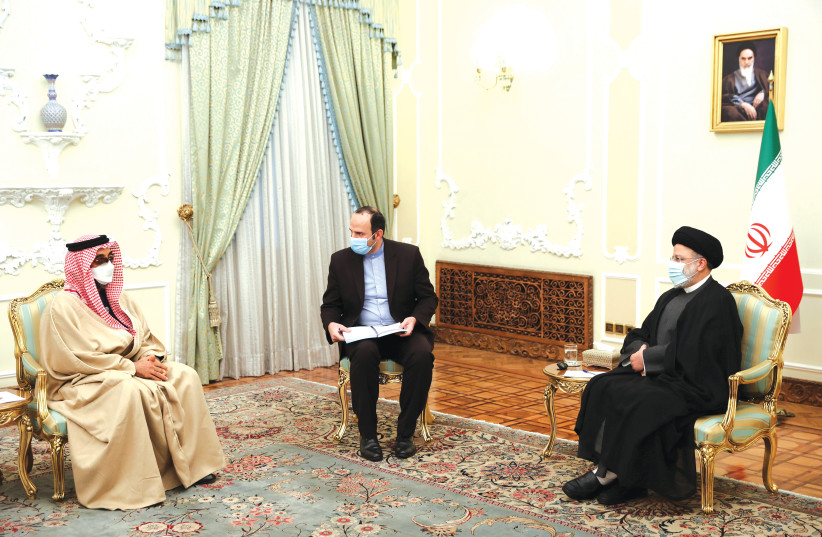After eight rounds of negotiations by the delegations of the five members of the Security Council and Germany, the Iran deal negotiations seem to be on the verge of success, unless Iran reverses its positions, sets new conditions and gets tougher, especially since the current international crisis between the great powers (tensions around Ukraine and Taiwan) is very much in its interest.
In this context, indications are given on how the negotiations are proceeding. Most interesting is the dismissal or resignation of Richard Nephew, the deputy of the United States (US) special envoy for Iran, Robert Malley, from the negotiating delegation.
According to media reports behind the scenes of the Vienna talks, the reason for this is the continued disagreement among the delegation members on the mechanism for conducting negotiations with Iran. Nephew favors a tougher approach because of his long experience in negotiations with Iran.
A supporter of the Obama deal, he combines his work on sanctions and nuclear nonproliferation with his experience negotiating with Iran prior to the 2015 JCPOA; however, he is also a tough negotiator. However, he is not the only one who has resigned or been dismissed, two other members of the US negotiating delegation have followed his lead.
Although the US is officially silent on the reasons for his departure from the negotiations, saying only that personnel changes after a year in government are very common, a few news articles may give a little insight into what happened. A report in the British magazine The Spectator suggests that negotiations have not been effective at all in previous rounds.
It is not just a fiasco for failing to extract concessions from Tehran, freezing further steps on the road to an atomic bomb is still a long way off, as well. It seems that Western negotiators have embarrassed themselves.
The report hints at greater concessions from Robert Malley to the Iranians. The magazine cites Western diplomatic sources that Malley was “the most dovish official we’ve ever seen,” and points out that Malley and his deputy Richard Nephew before he left the negotiating scene in Vienna, disagreed on this dovish approach.
Such was the disagreement between the two men that they surprisingly stopped talking to each other before last Christmas. Against this backdrop, many observers associate what could be described as a filtering of the US negotiating delegation with Iran’s abandonment of its refusal to negotiate directly with the Americans after the Americans stressed the importance of direct dialogue.
FOREIGN MINISTER Hossein Abdullahian then announced his country’s readiness for direct negotiations with the US, a development that has several connotations. The most serious of these is the Biden administration’s firm determination to reach any deal with Iran, regardless of its nature or duration, temporary or indefinite.
The White House turns a blind eye to the persistent dithering of Iranian negotiators, despite repeated US warnings of impatience, last chance and other positions that Iranians interpret more in light of the behavior of the US delegation in Vienna than what they read in the media.
The announcement by the US and Iranian sides that they are willing to negotiate directly may be a positive sign for some, but for others, it is a turning point that could lead to further US concessions and strategic advantages for Iran.
Some observers believe that President Biden is holding off on any formula for a deal with Iran because he fears that a failure of the negotiations could hurt the Democratic Party’s chances in the November midterm elections. A failure in Vienna would require other options to deal with the Iranian threat, which is why the White House is trying to avoid this situation altogether. Now, it is overlooking the time-buying tactics of the Iranian delegation in Vienna and ignoring warnings that Iran is moving closer to nuclear capability.
The main indication that the Biden administration is tying the Vienna negotiations to the congressional elections came from Robert Malley. He recently referred indirectly to the fact that a return to the Iran nuclear deal was tied to the release of four imprisoned US citizens. Malley had reaffirmed the US position that the issue of the four detained in Iran is separate from the nuclear negotiations, however, it is increasingly clear that their release is a precondition for a nuclear deal and some observers even considered it the only condition for a return to the agreement.
“They are separate and we are pursuing both of them,” Malley said. “But I will say it is very hard for us to imagine getting back into the nuclear deal while four innocent Americans are being held hostage by Iran.” This largely reflects a shift in the US position that I believe is moving toward an eventual deal with Iran that can be sold to the American public as a diplomatic and political gain.
In other words, the release of the four Americans may save President Biden’s face and allow him to assert that protecting American lives is more important than tightening sanctions on Iran and all of that. In fact, Iran as well as Russia, China, and other countries, militias and organizations perceive that US diplomacy has no claws. They believe that Biden is ruling out the option of war. This poses a serious threat to US influence and its global status.
The heart of the matter is that Iran has managed to buy time and build up its nuclear capabilities, during the period of circumventing its obligations under the nuclear deal since former president Trump withdrew from the agreement in 2018 and during the months of the current negotiation process.
Any agreement that might result from the Vienna negotiations would be a limited or conditional return to the original 2015 agreement at best. With respect to regional security and stability, there is not much new, but we should expect more chaos.
The writer is a UAE political analyst and former Federal National Council candidate.

